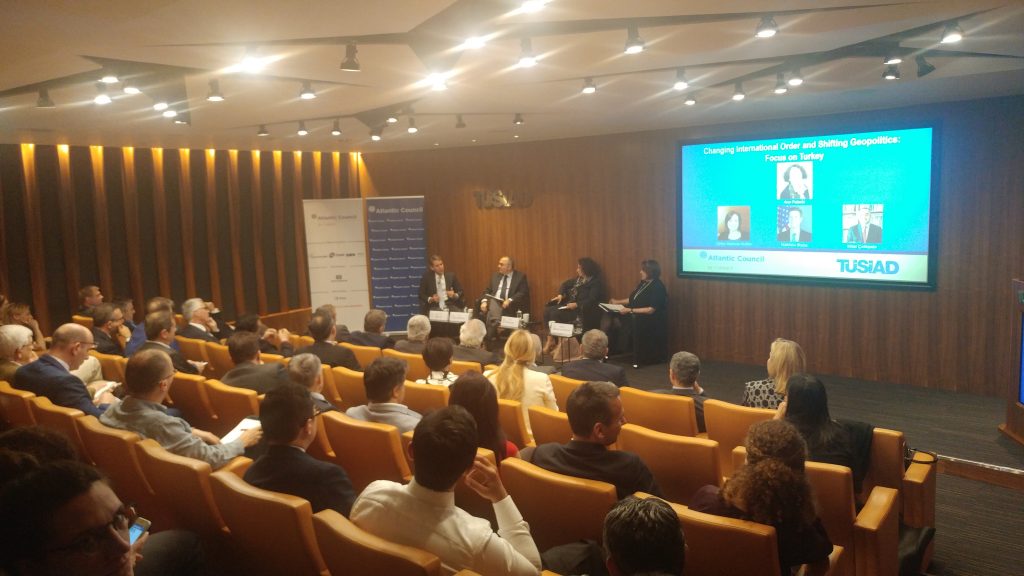On April 19, the Atlantic Council IN TURKEY, in partnership with the Turkish Industry and Business Association (TÜSİAD), hosted a panel titled “Changing international order and shifting geopolitics: focus on Turkey” in Istanbul. Moderated by Atlantic Council Turkey Representative Defne Sadıklar – Arslan, the panel, featuring Council of State of Spain member, former Minister of Foreign Affairs and Atlantic Council Executive Board Member Ana Palacio, Atlantic Council Nonresident Senior Fellow Matthew Bryza and Kadir Has University Dean of the Faculty of Economics, Administrative and Social Sciences Mitat Çelikpala, discussed the state of world affairs in light of ongoing challenges to the liberal world order.
In recent years, the world has witnessed increasing challenges to the post-World War II liberal order. The rise of populism and questioning of multilateral institutions such as the UN and EU has coincided with the inability of multilateral institutions to address the current challenges. Panelists stressed that the rules-based international order, which brought unprecedented economic growth and stability, is under threat both within and without. The US, which spearheaded the rules-based order, is no longer interested in its maintenance; the European Union is dealing with multiple crises and growing divisions among members states; meanwhile, other actors such as Russia and China present alternative visions of order. Panelists agreed that the optimism that gripped the democratic world following the fall of the Berlin Wall has vanished, replaced with a growing uncertainty in international affairs.
Despite the current state of uncertainty and pressing challenges to the rules-based global order, the panelists did highlight reasons to be cautiously optimistic. The Paris Agreement was one such major breakthrough. Despite US President Donald Trump’s announcement last year that the US will pull out of the agreement, the agreement nevertheless stands as a testament that multilateralism can still be successful in confronting pressing global challenges. The panel highlighted that the US is still the integral actor in upholding the rules-based international order. US leadership will be necessary to revamp the international order.
At the heart of many of the globe’s pressing issues, such as the Syrian Civil War, the refugee crisis and the West’s relations with Russia, sits Turkey. Panelists pointed out that the war in Syria has deeply affected Turkey’s security environment and politics. Panelists argued that the effects of the war and disagreements with the US over Syria, coupled with the dysfunction of the UN Security Council in resolving the conflict, pushed Turkey, a NATO member historically affiliated with the West, to cooperate with Russia. Now, as Russia and Turkey continue cooperating in Syria while tensions between Turkey and West reach a fever pitch, a growing number of commentators have suggested that Turkey’s status as part of the transatlantic community is in doubt.
Turkey and the US have been NATO allies since 1952. The panelists agreed that Turkey’s alignment with NATO and the transatlantic community contributed significantly to the West prevailing in the Cold War. Nevertheless, in recent years relations have sunk sharply to new lows over several serious disagreements. One panelist even warned that relations could be headed for a breaking point if steps are not taken. Still there have been positive signs. The two countries have shown a willingness to address the issues and reconcile their differences. Back in February, during a visit of former US Secretary of State Rex Tillerson, the two parties agreed to a series of working groups to resolve outstanding issues of disagreement. More recently, on April 27, in one of his first bilateral meetings since being officially confirmed Secretary of State, Mike Pompeo met with Turkish Minister of Foreign Affairs Mevlüt Çavusoğlu and approved a plan put forward by a working group on Syria.
Turkey’s relationship with the EU dates back nearly 60 years, when in 1959, it applied to become an associate member of the European Economic Community. Now, 13 years after the commencement of accession negotiations, the panelists were in agreement that it is unrealistic to expect any movement in Turkey’s accession bid in the foreseeable future as outlined in the EU’s very critical progress report released earlier in April. It was further argued that since the beginning, both sides had mismanaged the accession process and at times negotiated cynically. Despite not seeing any action on accession, the panelists stressed the importance and mutual benefits of increasing Turkish-EU cooperation and continuing dialogue. Turkey and the EU are important economic partners. Around half of Turkish exports go to EU markets while Turkey is the EU’s 4th largest export market. It was noted by the panel that economic relations would be further bolstered by updating the customs union agreement between the EU and Turkey, originally signed in 1995. Recently, Turkey and the EU have cooperated extensively on the refugee crisis. The EU Turkey migration deal, signed in March 2016, has dramatically reduced the flow of refugees into Europe by the Aegean route. Panelists pointed out that the refugee crisis and the Syrian Civil War have demonstrated Turkey’s importance to EU security.
Turkish-Russian relations have historically been based on economic and in particular energy relations. Turkey is significantly dependent on Russian natural gas, which amounted to 51.8% of Turkey’s gas imports in 2017. Turkey is also Russia’s second largest market for gas, after Germany. Recently, however, Turkey and Russia have deepened their geopolitical cooperation due to the war in Syria. It was argued that Turkey had no choice but to work with Russia in order to protect its security interests, particularly vis-à-vis the PKK-affiliated Syrian Kurdish YPG militia. Turkey has also brokered a deal to procure the Russian S-400 missile defense system, a move which has drawn rebuke from its NATO allies. Many commentators have interpreted these moves as signs that Turkey is gravitating away from NATO and the West and closer to Russia. The panel was skeptical that Turkish-Russian cooperation could ever replace Turkey’s cooperation with the West and noted that historically Turkey has typically improved relations with Russia during times of tension with the West as a balance.
